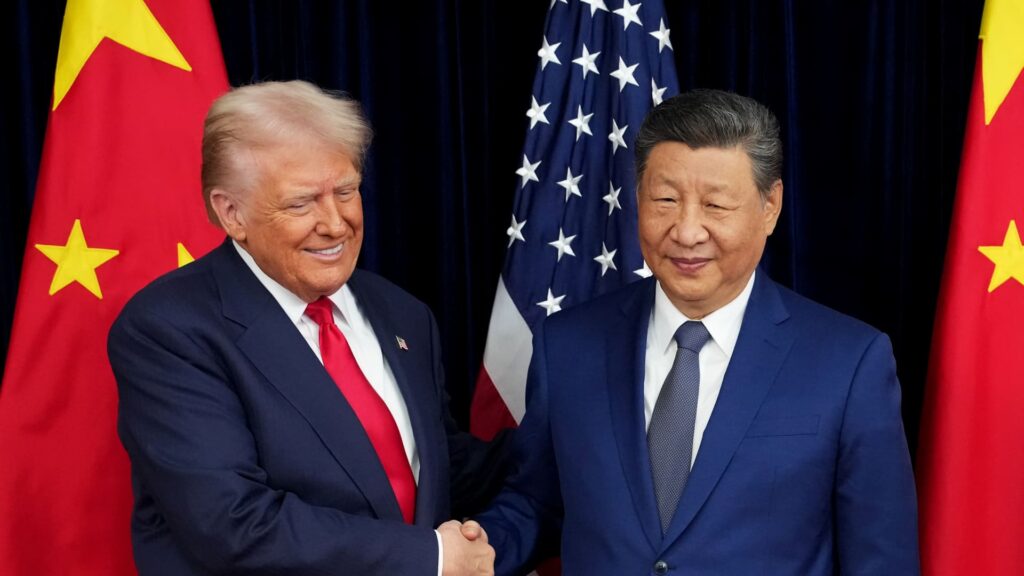BUSAN, South Korea – October 30: U.S. President Donald Trump greets Chinese President Xi Jinping ahead of bilateral talks at Gimhae Air Force Base in Busan, South Korea, on October 30, 2025.
Andrew Harnik | Getty Images News | Getty Images
Chinese President Xi Jinping said Thursday that China and the United States should be “partners and friends” during a meeting with US President Donald Trump on dealing with trade and tariff issues.
According to Chinese state media, the meeting ended in about an hour and 40 minutes, and the two leaders shook hands and left the venue without making any public comments.
This is the first direct meeting between the two leaders since President Trump began his second term in office in January.
Before the meeting, Mr. Trump posed for a photo with Mr. Xi and said, “I think the meeting will be very successful.” President Trump emphasized his relationship with the Chinese leader, calling Xi a “very tough negotiator” and saying, “We’ve always had a very good relationship.”
Asked if the two leaders would finalize a trade deal during their meeting, Trump said: “It’s possible. We’ll have a great understanding.”
“It is normal for the world’s two largest economies to have friction from time to time,” Xi said in his opening remarks, calling on both sides to work together to “ensure the steady sailing of the giant ship” of bilateral relations, according to a statement released by China’s Ministry of Foreign Affairs.
President Xi also praised President Trump’s efforts to resolve regional conflicts and emphasized China’s role in promoting peace negotiations on various issues. The Trump administration suggested earlier this month that China would play a limited role in ceasefire talks between Thailand and Cambodia.
“The talks themselves are not aimed at peace, but (Xi’s) main objective is to try to create an atmosphere conducive to an agreement,” said Tiancheng Xu, senior economist at the Economist Intelligence Unit.
The high-stakes meeting comes amid heightened tensions this year between the world’s two largest economies. The latest escalation occurred this month, with the Chinese government’s export restrictions and the US government’s threat to ban software exports to China.
In recent days, the United States has shared details of deals it hopes to reach with China, ranging from limiting the flow of fentanyl into the United States to selling TikTok from its Beijing-based parent company ByteDance. Tariffs, technical regulations, and rare earths are also on the table.
Beijing has been more cautious about the prospects for a deal, but in a sign that relations may end, China has bought its first cargo of U.S. soybeans in months, Reuters reported on Wednesday.
Han Sheng Lin, China director at advisory firm Asia Group, said the meeting between President Trump and Mr. Xi could be more of a “tactical pause than a strategic breakthrough,” with the two sides fighting over key differences in the U.S.-China conflict, such as technology control, supply chains and security tensions.
Lin added: “A temporary ceasefire is better than an out-of-control trade war.”
President Xi is in South Korea from Thursday to Saturday, his first state visit in 11 years, to attend the APEC summit in Gyeongju.
Shortly before the talks began, President Trump posted on Truth Social that he had ordered the Pentagon to resume nuclear weapons testing, claiming that the United States had the world’s largest nuclear arsenal, followed by Russia and China.
Lin said the remarks were “bold and disruptive,” adding that Trump was “forcing the room to focus on U.S. influence” ahead of the meeting. “If you win in a trade, that’s genius. If you poison the well, there’s going to be an even tougher peak ahead.”
Investors are paying close attention to the news from Busan as the US-China trade war keeps them nervous. Global markets soared early in the week on growing optimism that the United States and China could be close to a trade deal.
“Regardless of the short-term consequences, a return to dialogue and engagement is critical to moving the U.S.-China relationship forward in the long term,” said Curtis Chin, senior fellow chairman at the Milken Institute and former U.S. ambassador to the Asian Development Bank.
However, “after high-profile deals and talks, there is a need for proper implementation and implementation of commitments by both sides,” Chin said.

